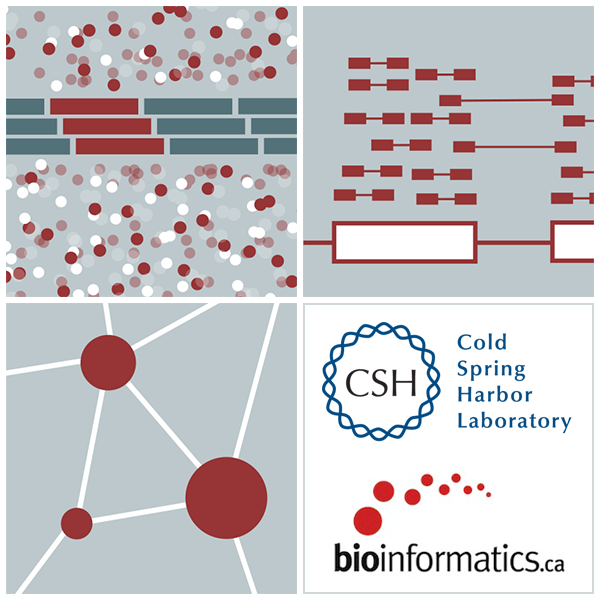
This course focuses on the analysis of DNA and RNA sequencing data, and is offered at Cold Spring Harbor in odd-numbered years. See this page for a companion course in cancer genomics data analysis, offered in even-numbered years.
With the introduction of next-generation sequencing platforms, it is now feasible to use high-throughput sequencing approaches to address many research questions. Now more than ever, it is crucial to know what bioinformatic tools and resources are available, and it is necessary to develop informatic skills to analyze high-throughput data using those tools. The Canadian Bioinformatics Workshops (CBW), in collaboration with Cold Spring Harbor Laboratory, has developed a comprehensive seven-day course covering key bioinformatics concepts and tools required to analyze DNA- and RNA-sequence reads using a reference genome. This course combines the material and concepts from three established CBW workshops; see a full outline here.
The course will begin with the workflow involved in moving from platform images to sequence generation, after which participants will gain practical skills for evaluating sequence read quality, mapping reads to a reference genome, and analyzing sequence reads for variation and expression level. The course will conclude with pathway and network analysis on the resultant ‘gene’ list. Participants will gain experience in cloud computing and data visualization tools. All class exercises will be self-contained units that include example data (e.g., Illumina paired-end data) as well as detailed instructions for installing all required bioinformatics tools.
Graduate students, postdoctoral scholars, and principal investigators currently working with data from next-generation sequencing platforms, or about to embark on projects that require analysis of such data. The course will focus mainly on data generated by Illumina machines. A reference genome is required; the course will not cover de novo assembly of sequence reads from organisms that do not already have a reference genome.
You must have basic familiarity with Linux environments and S, R, or Matlab to participate in this course. Everyone will need to complete and understand the following tutorials before attending the course: 1) Linux Tutorial for Beginners; and, 2) Quick & Dirty Guide to R.
Computer requirements: If selected for the course, you will need to bring your own laptop computer with wireless internet capacity. The minimum specifications are as follows: 1024×768 screen resolution, 1.5GHz CPU, 1GB RAM, and a recent version of the Windows, Mac OS X or Linux operating systems. Most laptops purchased in the past 3-4 years likely meet these requirements. If you do not have access to your own laptop, you may be able to borrow one from CSHL.
Duration: 7 days
Start: Mar 11, 2019
End: Mar 17, 2019
Status: Registration Closed
Workshop Ended

Canadian Bioinformatics Workshops promotes open access. Past workshop content is available under a Creative Commons License.
Posted on: